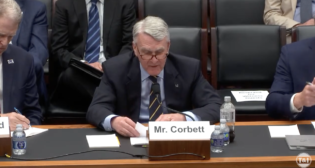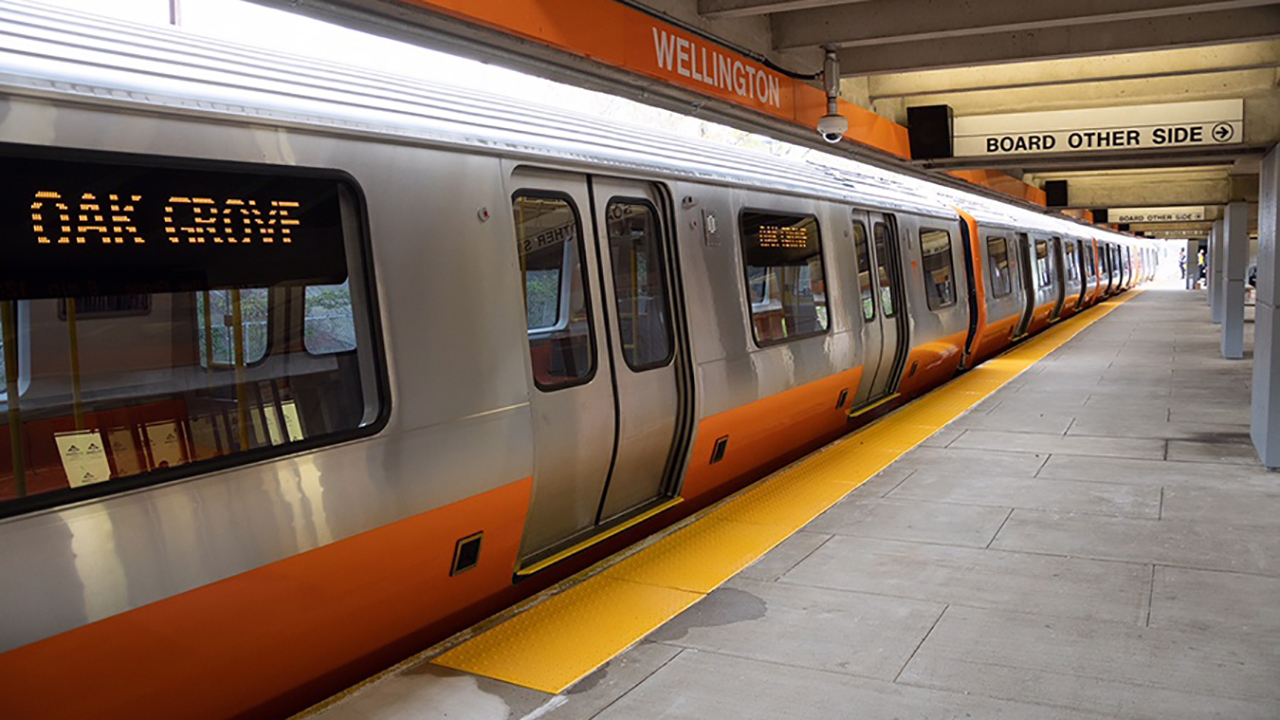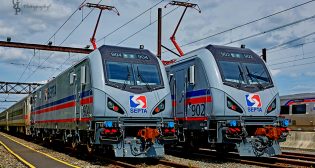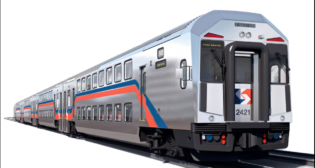
RSI: No Federal Funds for Chinese-Sourced Railcars
Written by William C. Vantuono, Editor-in-Chief
The Railway Supply Institute (RSI) sent a letter to Congress on Sept. 5 urging members of the House and Senate Armed Services Committees to preserve, in Conference, existing language in H.R.2500/S.1790, the National Defense Authorization Act (NDAA) for Fiscal Year 2020, that would prevent federal funds from being used to award a contract or subcontract for the procurement of transit vehicles to priority enterprises owned, controlled, or subsidized by SOEs (State-Owned Enterprises) falling under three specific definitions.
Those definitions apply to companies “incorporated in or [having] manufacturing facilities in the U.S. [and] owned or controlled by, a subsidiary of, or otherwise related legally or financially to a corporation based in a country identified as a nonmarket economy country of the Tariff Act of 1930, was identified by the United States Trade Representative in the most recent report required by section 182 of the Trade Act of 1974 as a priority foreign country, and is subject to monitoring by the Trade Representative under section 306 of the Trade Act of 1974.”
Both the House and Senate NDAA bills incorporate H.R. 2739/S.846, the Transit Infrastructure Vehicle Security Act (TIVSA), introduced in early 2019 by Representative Harley Rouda (D-Calif.) in the House and Sen. John Cornyn (R-Tex.) in the Senate. RSI describes TIVSA as “a bipartisan bill that will prevent federal taxpayer dollars from being used to purchase or subsidize the purchase of rail rolling stock from Chinese state-owned or state-directed entities. [It will] help create a level playing field that will allow this industry to continue to thrive in the U.S., while also enhancing our national security.”
Both TIVSA bills are active in the House and Senate as standalone legislation, and are gathering co-sponsors from both sides of the aisle. The only difference between the House and Senate versions, including the language now in NDAA (Sections 896* and 6015**, respectively) that must be reconciled, is that the House version applies only to rail transit rolling stock; the Senate version includes all transit rolling stock (rail and bus).
CRRC (China Railway Rolling Stock Corp.), at present the only passenger railcar builder that fits the descriptions contained in H.R.2500/S.1790, is the world’s largest manufacturer of passenger rail rolling stock. CRRC is currently building transit railcars for Massachusetts Bay Transportation Authority (Boston), Chicago Transit Authority, Los Angeles County Metropolitan Transportation Authority and Southeastern Pennsylvania Transportation Authority (Philadelphia), in U.S. facilities that employ U.S. workers.
At issue here is that, for each contract, CRRC, which is not an RSI member company, submitted bids substantially lower than its competitors, among them RSI member companies Siemens Mobility, Alstom Transport and Bombardier Transportation. (Non-RSI-member companies doing business in the U.S. include Stadler Rail, Kawasaki Railcar USA, Kinkisharyo, Sumitomo, Mitsubishi, Nippon Sharyo, Hyundai-Rotem and CAF.) All, though not domiciled in the U.S., are private companies with U.S. manufacturing facilities, and are not directly financially supported by the German, French, Canadian, Japanese, South Korean or Spanish governments.
These companies claim that the Chinese government’s support of CRRC gives it an unfair markey advantage, since public transportation agencies—even though best and final offers from bidders are scored on several unequally weighted measures (price, technical, local labor content, etc.)—are generally bound by law to award contracts to the lowest bidder.
Railway Age has heard officials from some of CRRC’s competitors privately refer to CRRC’s lowball bid practices as “Chinese dumping.” In recent years, there have been attempts at consolidation, specifically to address the “Chinese threat,” as it has been called. Bombardier unsuccessfully sought a merger partner for its Transportation business. Siemens and Alstom took a merger of their transportation business as far as forming a new senior management structure, but the European Union shot down the deal as anti-competitive.
“The largest passenger railcar builders in the U.S. are all foreign-owned companies, but unlike Chinese state-owned company CRRC, they do the vast majority of their manufacturing and sourcing domestically, often significantly exceeding federal Buy America requirements in the process,” RSI President Mike O’Malley pointed out in a press release. “We want folks to understand the stark differences between manufacturing and mere assembly operations, and how that difference impacts local communities and jobs around the country. This [reconciled] bill will help restore a level playing field, allowing this industry to continue to thrive in the U.S. while enhancing our national security. There are thousands of people employed by domestic passenger rail manufacturers, but we are seeing unfair competition from Chinese state-owned enterprises threaten those jobs while undermining our national security in the process.”
RSI’s letter to Congress states, in part:
“While our members have a strong presence across the U.S., they also market their products around the world and have complex global supply chains that support their manufacturing operations. Over the past few years, our members have witnessed increased government intervention in the global rail marketplace from foreign governments. Most notably, a Chinese-owned State-Owned Enterprise (SOE) called CRRC has identified rail manufacturing as a strategic market sector and made clear their intention to dominate the global railway supply and rolling stock market.
“Here in the U.S., CRRC and its affiliates have leveraged state-backed financing and below-market loan rates to secure $2.6 billion in railcar contracts for commuter agencies in Boston, Chicago, Los Angeles and Philadelphia, with other contracts pending, including one in Washington, D.C. The company has won these contracts by as much as 30% below the next lowest bid, raising significant questions about whether these are market-based offerings.
“Allowing an SOE to continue these activities creates both economic and national security concerns. These actions are already undermining a $74 billion-a-year industry, with current American rail supply manufacturers concerned that more SOE involvement will lead to a loss of domestic manufacturing and a reduction in American jobs. This also has long-term national security impacts, as demonstrated in Australia with the complete takeover by an SOE of the Australian domestic market and its capability to build passenger and freight railcars.
“America’s rail system covers more than 140,000 miles and carries 40% of America’s intercity freight, including 111 million tons per year of hazardous materials. Allowing a foreign, state-backed entity to increase direct investment in our nation’s critical infrastructure, particularly projects utilizing federal funding, creates significant economic and national security concerns.”
Opinions on CRRC’s entry into the U.S. passenger railcar market and its ability to successfully underbid competitors tend to run strongly in favor of prohibitions, as with RSI, or strongly against such restrictions, as stated in a Washington Post editorial by Contributor, DemocracyPost, Global Opinions Isaac Stone Fish titled How a Restriction on Chinese-Made Subway Cars Makes Life Harder for Commuters:
“CRRC may be the most undeserving Chinese company to be hit by the U.S.-China Trade War … It means some city governments may have to shop elsewhere and pay more per car. More-expensive subway cars mean fewer subway cars for American cities’ cash-strapped transit authorities. And that means worse traffic—as some commuters opt for driving instead of waiting impatiently for the metro—longer commutes and more global warming … I’m glad Washington is waking up to the worrying links between many Chinese companies and the ruling Chinese Communist Party, and the national security risks they create for the United States. And I understand the Trump Administration’s desire to punish Beijing for unfairly restricting American companies in China through tariffs on Chinese goods and the reduction of Chinese investment in the United States. But hurting American commuters to punish CRRC is just silly. Not all Chinese, state-run companies are bad for American interests. CRRC is an example of a company that, while firmly under state control, does more good for the United States than harm.”
But Stone Fish was wrong on one important point, perpetuating a myth about transit car manufacturers that persists to this day: “[N]o U.S. companies build subway cars … [T]here are no domestic manufacturers of transit cars. CRRC bid lower than Canadian, South Korean and Japanese firms (referring to the Los Angeles contract), in part because of Beijing’s support and in part because CRRC makes a good product. Why use taxpayer money to subsidize a Japanese or Korean firm? [T]he Chinese are a world leader in subway cars. American brands no longer make them. Let’s get over it, so we can get to work on time.”
Really? Tell that to Siemens, who has been building passenger rail rolling stock (LRVs, intercity coaches, and electric and diesel-electric locomotives), and supplying AC traction motors for line haul freight locomotives for generations. Or Bombardier, Alstom, or any of the other well-established private companies mentioned above. They’re no less “American” than global motor vehicle manufacturers Ford, GM, Fiat-Chrysler, Toyota, Nissan, BMW, etc. The difference between these companies and CRRC is that they’re not SOEs propped up by government investment, as Mike O’Malley correctly has pointed out.
* SEC. 896. Requirements relating to certain rail rolling stock procurements and operations. (HOUSE)
(a) Limitation on certain rail rolling stock procurements.—Section 5323 of title 49, United States Code, is amended by adding at the end the following:
“(u) Limitation on certain rail rolling stock procurements.—
“(1) IN GENERAL.—Except as provided in paragraph (5), financial assistance made available under this chapter shall not be used in awarding a contract or subcontract to an entity on or after the date of enactment of this subsection for the procurement of rail rolling stock for use in public transportation if the manufacturer of the rail rolling stock—
“(A) is incorporated in or has manufacturing facilities in the United States; and
“(B) is owned or controlled by, is a subsidiary of, or is otherwise related legally or financially to a corporation based in a country that—
“(i) is identified as a nonmarket economy country (as defined in section 771(18) of the Tariff Act of 1930 (19 U.S.C. 1677(18))) as of the date of enactment of this subsection;
“(ii) was identified by the United States Trade Representative in the most recent report required by section 182 of the Trade Act of 1974 (19 U.S.C. 2242) as a priority foreign country under subsection (a)(2) of that section; and
“(iii) is subject to monitoring by the Trade Representative under section 306 of the Trade Act of 1974 (19 U.S.C. 2416).
“(2) EXCEPTION.—For purposes of paragraph (1), the term ‘otherwise related legally or financially’ does not include a minority relationship or investment.
“(3) INTERNATIONAL AGREEMENTS.—This subsection shall be applied in a manner consistent with the obligations of the United States under international agreements.
“(4) CERTIFICATION FOR RAIL ROLLING STOCK.—
“(A) IN GENERAL.—Except as provided in paragraph (5), as a condition of financial assistance made available in a fiscal year under section 5337, a recipient that operates rail fixed guideway service shall certify in that fiscal year that the recipient will not award any contract or subcontract for the procurement of rail rolling stock for use in public transportation with a rail rolling stock manufacturer described in paragraph (1).
“(B) SEPARATE CERTIFICATION.—The certification required under this paragraph shall be in addition to any certification the Secretary establishes to ensure compliance with the requirements of paragraph (1).
“(5) EXCEPTION.—This subsection, including the certification requirement under paragraph (4), shall not apply to the award of a contract or subcontract made by a public transportation agency with a rail rolling stock manufacturer described in paragraph (1) if the manufacturer and the public transportation agency have a contract for rail rolling stock that was executed before the date of enactment of this subsection.”.
(b) Cybersecurity certification for rail rolling stock and operations.—Section 5323 of title 49, United States Code, as amended by subsection (a), is amended by adding at the end the following:
“(v) Cybersecurity certification for rail rolling stock and operations.—
“(1) CERTIFICATION.—As a condition of financial assistance made available under this chapter, a recipient that operates a rail fixed guideway public transportation system shall certify that the recipient has established a process to develop, maintain, and execute a written plan for identifying and reducing cybersecurity risks.
“(2) COMPLIANCE.—For the process required under paragraph (1), a recipient of assistance under this chapter shall—
“(A) utilize the approach described by the voluntary standards and best practices developed under section 2(c)(15) of the National Institute of Standards and Technology Act (15 U.S.C. 272(c)(15)), as applicable;
“(B) identify hardware and software that the recipient determines should undergo third-party testing and analysis to mitigate cybersecurity risks, such as hardware or software for rail rolling stock under proposed procurements; and
“(C) utilize the approach described in any voluntary standards and best practices for rail fixed guideway public transportation systems developed under the authority of the Secretary of Homeland Security, as applicable.
“(3) LIMITATIONS ON STATUTORY CONSTRUCTION.—Nothing in this subsection shall be construed to interfere with the authority of—
“(A) the Secretary of Homeland Security to publish or ensure compliance with requirements or standards concerning cybersecurity for rail fixed guideway public transportation systems; or
“(B) the Secretary of Transportation under section 5329 to address cybersecurity issues as those issues relate to the safety of rail fixed guideway public transportation systems.”.
** SEC. 6015. Limitation on certain rolling stock procurements; cybersecurity certification for rail rolling stock and operations. (SENATE)
Section 5323 of title 49, United States Code, is amended by adding at the end the following:
“(u) Limitation on certain rolling stock procurements.—
“(1) IN GENERAL.—Except as provided in paragraph (5), financial assistance made available under this chapter shall not be used in awarding a contract or subcontract to an entity on or after the date of enactment of this subsection for the procurement of rolling stock for use in public transportation if the manufacturer of the rolling stock—
“(A) is incorporated in or has manufacturing facilities in the United States; and
“(B) is owned or controlled by, is a subsidiary of, or is otherwise related legally or financially to a corporation based in a country that—
“(i) is identified as a nonmarket economy country (as defined in section 771(18) of the Tariff Act of 1930 (19 U.S.C. 1677(18))) as of the date of enactment of this subsection;
“(ii) was identified by the United States Trade Representative in the most recent report required by section 182 of the Trade Act of 1974 (19 U.S.C. 2242) as a priority foreign country under subsection (a)(2) of that section; and
“(iii) is subject to monitoring by the Trade Representative under section 306 of the Trade Act of 1974 (19 U.S.C. 2416).
“(2) EXCEPTION.—For purposes of paragraph (1), the term ‘otherwise related legally or financially’ does not include a minority relationship or investment.
“(3) INTERNATIONAL AGREEMENTS.—This subsection shall be applied in a manner consistent with the obligations of the United States under international agreements.
“(4) CERTIFICATION FOR RAIL ROLLING STOCK.—
“(A) IN GENERAL.—Except as provided in paragraph (5), as a condition of financial assistance made available in a fiscal year under section 5337, a recipient that operates rail fixed guideway service shall certify in that fiscal year that the recipient will not award any contract or subcontract for the procurement of rail rolling stock for use in public transportation with a rail rolling stock manufacturer described in paragraph (1).
“(B) SEPARATE CERTIFICATION.—The certification required under this paragraph shall be in addition to any certification the Secretary establishes to ensure compliance with the requirements of paragraph (1).
“(5) EXCEPTION.—This subsection, including the certification requirement under paragraph (4), shall not apply to the award of a contract or subcontract made by a public transportation agency with a rail rolling stock manufacturer described in paragraph (1) if the manufacturer and the public transportation agency have a contract for rail rolling stock that was executed before the date of enactment of this subsection.
“(v) Cybersecurity certification for rail rolling stock and operations.—
“(1) CERTIFICATION.—As a condition of financial assistance made available under this chapter, a recipient that operates a rail fixed guideway public transportation system shall certify that the recipient has established a process to develop, maintain, and execute a written plan for identifying and reducing cybersecurity risks.
“(2) COMPLIANCE.—For the process required under paragraph (1), a recipient of assistance under this chapter shall—
“(A) utilize the approach described by the voluntary standards and best practices developed under section 2(c)(15) of the National Institute of Standards and Technology Act (15 U.S.C. 272(c)(15)), as applicable;
“(B) identify hardware and software that the recipient determines should undergo third-party testing and analysis to mitigate cybersecurity risks, such as hardware or software for rail rolling stock under proposed procurements; and
“(C) utilize the approach described in any voluntary standards and best practices for rail fixed guideway public transportation systems developed under the authority of the Secretary of Homeland Security, as applicable.
“(3) LIMITATIONS ON STATUTORY CONSTRUCTION.—Nothing in this subsection shall be construed to interfere with the authority of—
“(A) the Secretary of Homeland Security to publish or ensure compliance with requirements or standards concerning cybersecurity for rail fixed guideway public transportation systems; or
“(B) the Secretary of Transportation under section 5329 to address cybersecurity issues as those issues relate to the safety of rail fixed guideway public transportation systems.”



